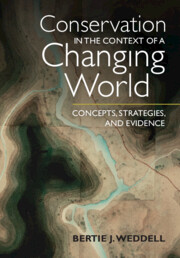Book contents
- Conservation in the Context of a Changing World
- Conservation in the Context of a Changing World
- Copyright page
- Dedication
- Contents
- Preface
- Acknowledgments
- Introduction
- Part I Maintaining Populations of Featured Species: A Utilitarian Approach to Conservation
- 1 Historical Context
- 2 Central Concepts
- 3 Strategies
- 4 Strategies
- Part II Protecting and Restoring Populations and Habitats: A Preservationist Approach to Conservation
- Part III Promoting Biocultural Diversity and Resilience: A Stewardship Approach to Conservation
- Postscript
- Appendix: Types of Ecosystems
- Bibliography
- Index
1 - Historical Context
Beginnings of Formal Utilitarian Conservation
from Part I - Maintaining Populations of Featured Species: A Utilitarian Approach to Conservation
Published online by Cambridge University Press: 28 September 2023
- Conservation in the Context of a Changing World
- Conservation in the Context of a Changing World
- Copyright page
- Dedication
- Contents
- Preface
- Acknowledgments
- Introduction
- Part I Maintaining Populations of Featured Species: A Utilitarian Approach to Conservation
- 1 Historical Context
- 2 Central Concepts
- 3 Strategies
- 4 Strategies
- Part II Protecting and Restoring Populations and Habitats: A Preservationist Approach to Conservation
- Part III Promoting Biocultural Diversity and Resilience: A Stewardship Approach to Conservation
- Postscript
- Appendix: Types of Ecosystems
- Bibliography
- Index
Summary
In early human societies, community norms specified where and how living resources should be used within sacred groves and in exploited places. Many rulers of ancient and medieval societies issued decrees reserving game and other wild resources for royalty and limiting peasant uses. Colonial rulers criminalized Indigenous uses of wild species and privatized and commercialized landscapes. Intensive exploitation led to the depletion and extinction of many species and laid the foundation for formal conservation. Concern about deforestation in colonial India led to early forest reserves. The utilitarian disciplines of wildlife management, forestry, range management, and soil science arose in response to threats to living natural resources due to conquest, including intensive exploitation, habitat alteration, and the introduction of non-native species. These disciplines focus on the exploitation of economically valuable species to protect a long-term supply. Early forest reserves in the USA were set aside to regulate the use of forest resources.
Keywords
- Type
- Chapter
- Information
- Conservation in the Context of a Changing WorldConcepts, Strategies, and Evidence, pp. 15 - 37Publisher: Cambridge University PressPrint publication year: 2023



